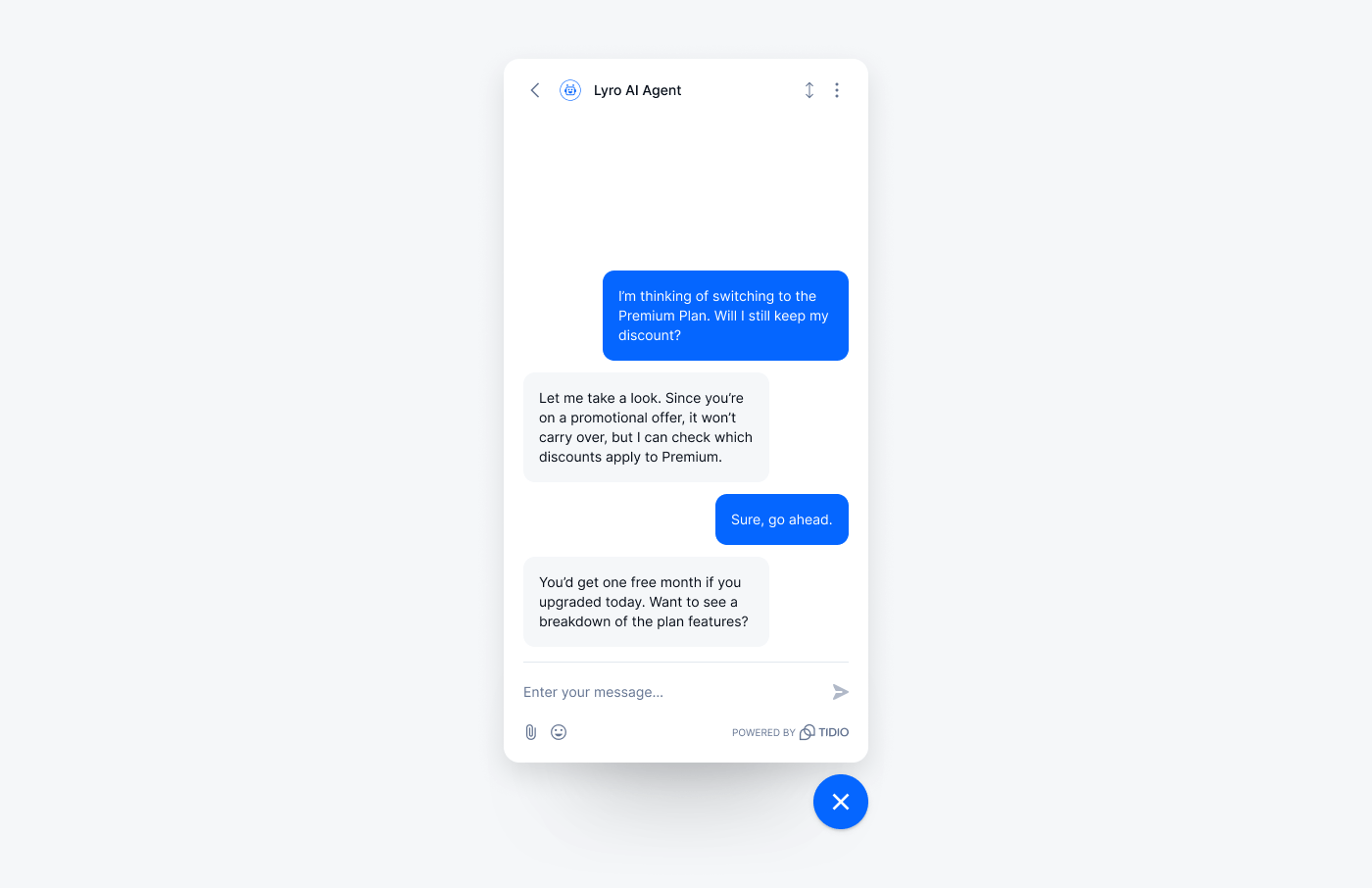Customer service tools shape the way your team works. They influence everything from your team’s responsiveness and capacity to the overall quality of each customer interaction.
This guide is for CX leaders and ecommerce decision-makers who are reviewing their support stack and considering a shift toward AI tools. It’s meant to give you a clear side-by-side comparison of traditional help desks and AI-powered platforms like Tidio. We based it on the priorities that matter most: speed, scalability, and the ability to manage workload without adding more tools or people.
Inside, you’ll find key capabilities to look for and practical evaluation points, alongside a framework for choosing a solution that fits your support goals.
Begin automating your support with Lyro AI today
Traditional vs. AI help desk: at a glance
| Capability | Traditional Help Desk | AI-Powered Help Desk (Tidio + Lyro/Copilot) |
|---|---|---|
| Response time | Agent availability, SLA-based | Instant replies 24/7 via AI agents |
| Ticket resolution | Manual handling with limited automation | Up to 70% automated resolution through AI |
| Multilingual support | Requires multilingual staff | Built-in translation |
| Proactive engagement | Reactive, user-initiated | Behavior-based triggers and outreach |
| Agent workflow | Tab-switching, fragmented tools | Inline suggestions inside Zendesk, Gmail, etc. |
| Setup time | Weeks, often with dev support | Live in minutes with no-code tools |
| Scalability | Team size-dependent | Automation scales without extra headcount |
| Cost efficiency | Costs increase with each new agent | Free to start, automation drives early ROI |
| Security & compliance | Varies by vendor | Encrypted, GDPR/CCPA-compliant by default |
To make the right choice, it helps to know what modern support tools should offer. Use our detailed checklist below to compare traditional help desks with AI-powered platforms. It can help you evaluate how well your current help desk stacks up and where AI tools like Tidio can fit in.
Response speed & availability
- Can your help desk offer real-time replies 24/7?
- Traditional tools: Operate during business hours with delays from ticket queues and agent handoffs. Customers often wait hours for updates, especially outside standard support hours.
- AI tools: AI delivers instant responses through live chat and automated flows. It ensures customers can get help at any time without relying on human availability. AI agents now automate the majority of routine conversations, and some businesses using Lyro AI have reached resolution rates of over 85% without agent involvement.[1]
- Is the first-response time consistently under 5 seconds?
- Traditional tools: Bound by SLAs and agent availability. Even simple questions can sit unanswered if the queue is long.
- AI tools: A tool like Lyro AI Agent instantly responds to questions like “Where’s my order?” or “What’s your return policy?” This keeps conversations moving while reducing pressure on live agents.
Automation of repetitive tasks
- Can it handle a significant portion of tickets without agent involvement?
- Traditional tools: Offer basic automation through rule-based triggers or macros. These often require regular updates and still rely heavily on manual input for resolution.
- AI tools: A tool like Tidio combines Lyro’s autonomous resolution with Copilot’s assistive replies to handle the majority of conversations automatically. In fact, over 90% of service teams adopting AI report measurable gains in productivity, cost efficiency, and customer satisfaction.[1]
- Does it include no-code automation templates for ecommerce use cases?
- Traditional tools: Typically require manual flow-building or technical support to implement even common scenarios. This slows down onboarding and limits agility.
- AI tools: Includes plug-and-play flows for tasks like refunds, cancellations, and discount codes. You can launch automations in minutes, directly from the Tidio panel.
Customer experience & personalization
- Does it personalize support using previous chat history or order info?
- Traditional tools: Agents often need to manually search through past tickets or CRM records to get context, which slows down resolution.
- AI tool: Automatically reference previous conversations or orders to deliver helpful, context-aware replies. This keeps the experience smooth without repeating information.
- Is multilingual support included, without hiring extra staff?
- Traditional tools: Rely on dedicated multilingual agents or third-party translation tools that may not work in real time.
- AI tools: A tool like Lyro supports 12 languages and responds in the language of your widget, using the correct translation pack. It uses existing data sources across languages, so teams can support international customers with ease.
Proactive engagement
- Can your help desk automatically offer support based on what the customer is doing?
- Traditional tools: Static workflows require users to initiate contact, and outreach is often limited to form submissions or email follow-ups. These systems rarely adapt to real-time actions, leaving engagement gaps when customers hesitate.
- AI tools: Capable of triggering messages when users linger on pages, revisit abandoned carts, or scroll through key sections. This ensures you offer help to customers before they ask.
- Does it blend support with sales?
- Traditional tools: Designed mainly for issue resolution, not for driving conversions. There’s no built-in way to recommend products or offer assistance based on shopping behavior.
- AI tools: Actively assist shoppers by suggesting products and answering pre-purchase questions. This turns support into a revenue channel, improving customer experience while lifting conversions. Brands like eye-oo reported a fivefold boost in conversions after implementing Tidio’s sales-focused automation features.[1]
Agent productivity and workflow integration
- Do agents get reply suggestions inside their existing help desk tools?
- Traditional: Requires switching between platforms to search for answers or canned responses, slowing down response time. This fragmentation makes it harder to maintain focus and respond efficiently.
- AI tools: Tidio Copilot shows smart reply suggestions directly inside Zendesk, Intercom, and other tools without needing to switch tabs. Agents stay in flow while getting helpful and on-brand responses in an instant.
Give your team superhuman speed with Tidio Copilot
- Is it easy to onboard new agents and maintain consistency?
- Traditional: Training new team members takes time and often relies on shadowing or lengthy documentation. Inconsistencies in tone and accuracy are common, especially in fast-growing teams.
- AI tools: Suggest accurate responses based on your verified knowledge base, helping new agents ramp up faster—a benefit that’s helped over 62% of business leaders justify AI investments.[1]
Setup, scalability & maintenance
- How fast can you deploy and scale your support automation?
- Traditional: Weeks of configuration, plus costly add-ons or developer hours for each new feature. Scaling requires additional tools and manual setup that slows down the time-to-value ratio.
- AI tools: Offer quick installation with a no-code builder, letting teams launch live chat and basic automation within minutes. More advanced Tidio features like Lyro and Flows can be set up at your own pace.
- Can support teams update content without developers?
- Traditional: Any change to support flows or responses usually means tickets to IT or updates to backend systems. This adds delays and creates friction when agility is needed.
- AI tools: Marketers or managers can instantly update Q&A pairs and bot responses through a user-friendly interface. No backend access or coding required.
Cost, ROI & value
- Can you cut support costs while improving the experience?
- Traditional: Cost scales linearly with team size, as each new agent adds to salary, training, and software expenses. There’s little room to reduce costs without sacrificing service quality.
- AI tools: Lyro resolves tickets automatically while Copilot reduces workload. Automation offloads repetitive tasks, helping teams do more with fewer resources. For example, MattressNextDay, an Award-winning UK mattress retailer, automated 73% of conversations using Lyro and had 400+ hours saved monthly.[1]
- Is there a clear path to ROI in 30–60 days?
- Traditional: High setup fees and ongoing agent costs make it hard to realize ROI quickly. Results often depend on hiring more staff or making larger operational changes.
- AI tools: Tidio is free to start and tracks ROI through metrics like resolution rate, lower average handle time (AHT), and higher conversions from support. Most teams start seeing results within just a few weeks.
Platform security & compliance
- Is your help desk GDPR/CCPA-compliant and offers enterprise-grade features?
- Traditional: Compliance varies by vendor, and features like audit logging or granular permissions often require premium plans. Ensuring AI outputs meet privacy standards can be a manual process.
- Tidio: Ensures data encryption at rest and in transit, offers role-based access control, maintains audit logs, and supports compliance-ready AI interactions. These protections are built into the platform by default, with no enterprise add-ons required.
Is your support strategy ready for automation-first CX?
Customer expectations aren’t what they used to be, and traditional help desk systems aren’t always built to keep up.
Many of the tools that once got the job done are now slowing teams down or stretching resources thin. That’s why so many CX leaders are exploring platforms built with automation in mind, where speed and personalization are essential to how support works.
This checklist gives you a practical way to reflect on your current setup and spot areas that might benefit from something smarter. By comparing traditional tools to AI-powered options like Tidio and its Lyro AI Agent and Copilot, you can identify what needs improvement and how automation can lighten the load on your team. Use the scores from each section to highlight opportunity areas and support your case for change.

Launch your first Lyro AI Agent or the Copilot assistive extension in just minutes.
No IT setup needed. No commitment required. Start automating your support right away.
Begin automating your support with Lyro AI today

